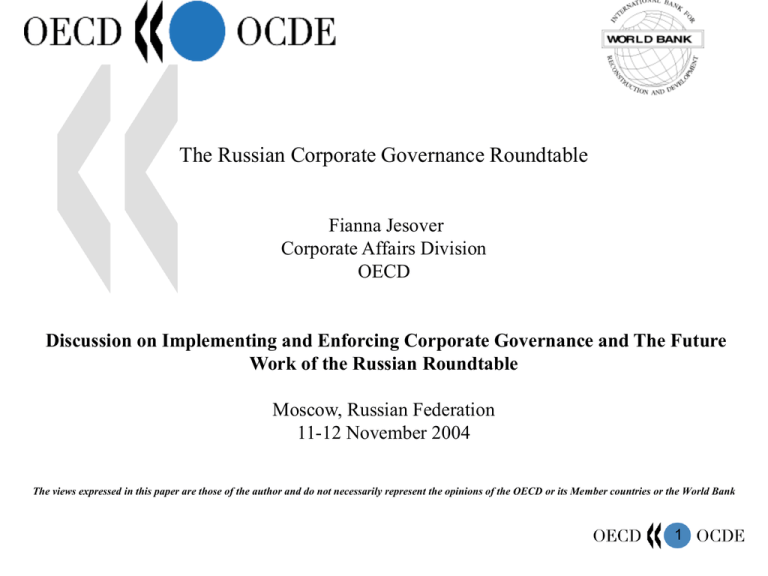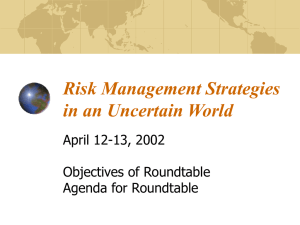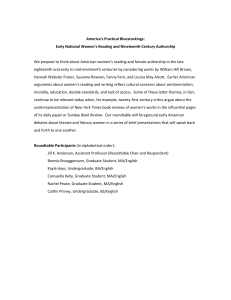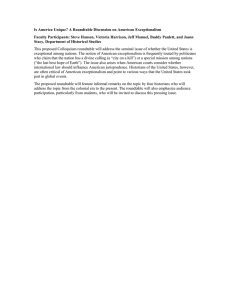The Russian Corporate Governance Roundtable
advertisement

The Russian Corporate Governance Roundtable Fianna Jesover Corporate Affairs Division OECD Discussion on Implementing and Enforcing Corporate Governance and The Future Work of the Russian Roundtable Moscow, Russian Federation 11-12 November 2004 The views expressed in this paper are those of the author and do not necessarily represent the opinions of the OECD or its Member countries or the World Bank 1 What we would like to discuss this afternoon 1. 2. Refresher: Roundtable objectives and reform priorities set out in the White Paper on Corporate Governance in Russia What we have accomplished since the White Paper’s release in 2002 3. How can the Roundtable continue to support implementation and enforcement of corporate governance? 4. The future work of the Russian Corporate Governance Roundtable 2 Keeping in mind the Roundtable’s purpose i) Facilitate Russian participation in a international policy dialogue on the basis of the OECD Principles on Corporate Governance, the White Paper on Corporate Governance in Russia and the Russian Code of Corporate Conduct, other relevant materials. ii) Provide a forum in which Russian policymakers and experts can strengthen and develop contacts with their peers in OECD countries and to facilitate exchange of experience. iii) Support reform analysis by advancing the understanding of viable policy-options as well as implementation and enforcement mechanisms in the area of corporate governance. 3 The White Paper on Corporate Governance Priority 1: Intensify implementation and enforcement. The legal and regulatory framework must more effectively implement and enforce existing laws and regulations relating to companies and securities markets. Effective implementation and enforcement require vigorous investigation of possible wrongdoing as well as sanctions sufficiently sure and severe to deter abuses. In particular, the inequitable treatment of shareholders, asset stripping by managers or controlling shareholders and violations of disclosure requirements need to be addressed. Progress in these areas will not only require action by the government, but leadership from stock exchanges, business associations, professional organisations and individual companies. 4 The White Paper on Corporate Governance Priority 2: Ensure clarity and coherence. The respective competencies of regulatory bodies and institutions must be delineated in order to enhance coherence among various legal and regulatory provisions 5 The White Paper on Corporate Governance Priority 3:Facilitate the development of a corporate governance culture in the private sector. The legal and regulatory framework should be streamlined as much as possible. Lawmakers must always seek a balance between the benefits of a rule, the administrative burdens and the compliance costs it imposes upon enterprises. 6 The White Paper on Corporate Governance Priority 4: Support and enhance the development of training programmes. The training of judges, government officials as well as managers, board members, accountants and auditors must become a priority for governmental bodies, professional associations, and individual companies. This is of particular importance in order to raise the general awareness of good corporate governance, keep up with any changes in the laws, facilitate the transition to international financial reporting standards, and develop professional boards. 7 The White Paper on Corporate Governance Priority 5: Ensure continuing support and review of progress. In launching the White Paper, Russia now enters a new and exciting phase in its legal and economic development. The OECD has been pleased to assist Russian officials, professional bodies, technical experts, academics and businessmen in developing the White Paper. The OECD remains a committed partner in driving the work of the Roundtable forward. In fact, in cooperation with our Russian partners, we are already taking steps to begin this next and perhaps most important phase of work. 8 Next phase of implementation and enforcement Between the release of the White Paper in 2002 and the next phase of the Roundtable that was kicked off in 2003, the Roundtable has defined a set of priorities for in-depth study. In 2003, the Roundtable kicked of the “post-White Paper” phase with a meeting on disclosure, specifically IFRS, RPTs, Beneficial Ownership and Insider Trading. The Roundtable agreed to establish two task forces to provide (1) a roadmap for transition to IFRS (2) policy options for improving related party transactions and beneficial ownership The task forces have worked during 2004 to produce this outputs and reported back to the Roundtable this week. 9 How can the Roundtable continue to support implementation and enforcement of corporate governance? 1. Stock-taking exercise to monitor progress : Does the Roundtable feel that this is necessary? How should we approach this exercise? What should be ultimate aim/outcome? Should we do this in 2005 or 2006? --- Monitoring: ROSC and ad-hoc assessment by S&P 1. In depth analysis of new issues: 10 How can the Roundtable support implementation and enforcement of corporate governance? Identify 1 or 2 topics for investigation to be mandated by the Roundtable for further in dept work by the Task Forces: Topic 1 1. Corporate governance of state-owned assets: This work would benefit from the OECD Guidelines on Corporate Governance of State-Owned Assets that will be finalized early next year. Already, the FSFM and the Ministry of Economy took part in the consultative process in preparing the guidelines. As public authorities are calling for higher standards of corporate governance in the private sector, it is natural that the same authorities ensure that the public sector also applies high standards to manage of its state-owned assets. The SOE sector is a very important one for the Russian economy and our Russian partners have requested us to focus the Roundtable’s future work in this area. 11 How can the Roundtable support implementation and enforcement of corporate governance? Topic 2: Enforcement Experience with the application of legal redress, looking at civil and administrative remedies Effectiveness of procedures, investigative and regulatory institutions Company reports on emerging practices 12 Next steps: This month, the paper adopted yesterday by the Roundtable on IFRS implementation will be published in glossy form and disseminated broadly. After receiving your comments next week on the paper we discussed today, we will revise it, resend for final comments and complete before year-end. The Roundtable will next meet in June 2005 to discuss in-depth the 1 or 2 chosen subjects, based on analytical work developed by Russian and EU experts. At the June 2005 meeting, the Roundtable would decide on which specific issues require more in-depth work through task forces. The task forces would work through 2005 and report back to the Roundtable in 2006 with concrete policy options and/or guidance on the implementation process 13



